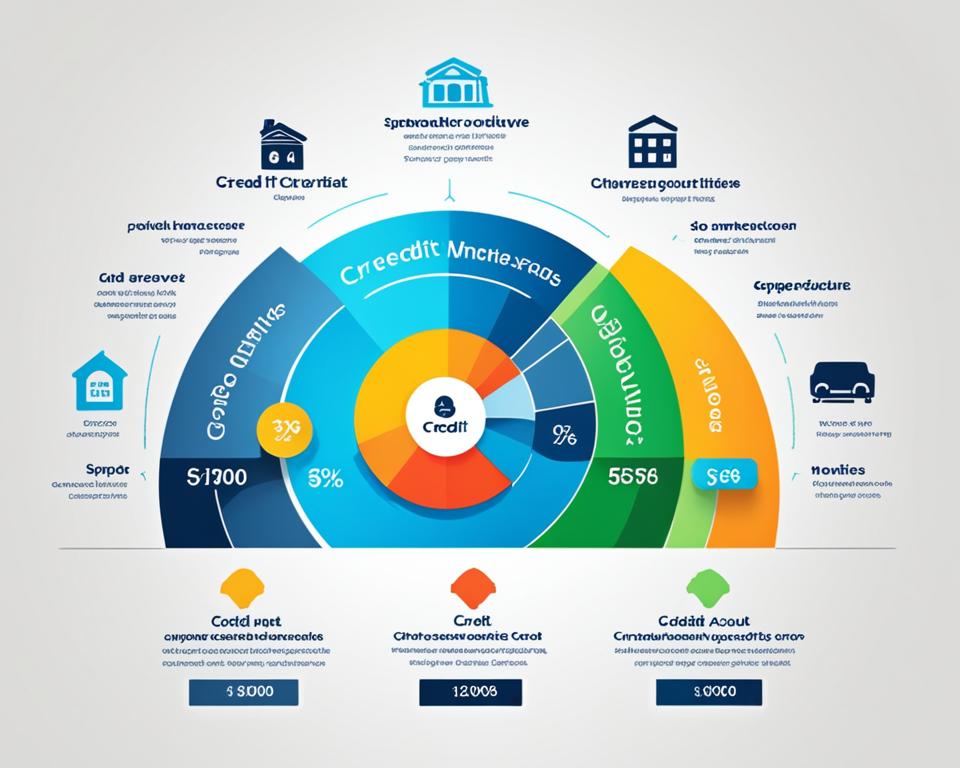Managing debts can be challenging, especially when they start to pile up and negatively impact your credit score. If you’re looking for an effective credit repair tip, debt consolidation may be the solution for you.
Debt consolidation is a credit management strategy that involves combining multiple debts into a single loan or repayment plan. By doing so, you can simplify your finances, make your debt more manageable, and improve your credit score in the process.
Through debt consolidation, you’ll be able to streamline your debt repayment process, ensuring that you don’t miss any payments and therefore boosting your creditworthiness. With fewer individual debts to manage, you’ll have a clearer picture of your financial obligations, making it easier to stay on top of your payments and ultimately improve your credit score.
Key Takeaways:
- Debt consolidation is a credit repair tip that can help improve your credit score and overall financial wellness.
- By consolidating your debts, you can simplify your repayment process and make it easier to manage your finances.
- Timely payments, made possible through debt consolidation, are crucial in improving your credit score.
- Debt consolidation offers benefits beyond credit repair, including stress reduction and potential cost savings.
- Before consolidating your debts, carefully consider your financial goals and evaluate the terms and conditions of available options.
Understanding Debt Consolidation
Before diving into the details of how debt consolidation can improve credit, it’s crucial to understand what debt consolidation is. Debt consolidation is a credit management strategy that involves combining multiple debts into a single loan or repayment plan. This can be done through various methods, including obtaining a debt consolidation loan or enrolling in a debt management program.
Debt consolidation offers individuals the opportunity to simplify their finances and streamline their repayment process. By consolidating multiple debts into one, individuals can potentially lower their monthly payments, reduce interest rates, and gain better control over their finances.
One of the common methods of debt consolidation is obtaining a debt consolidation loan. This involves taking out a new loan to pay off existing debts, leaving individuals with a single monthly payment at a potentially lower interest rate. Debt consolidation loans are usually offered by banks, credit unions, or online lending platforms.
“Debt consolidation is like hitting the reset button on your debts. It allows you to simplify your repayment process and focus on a single loan or repayment plan, which can be much more manageable.”
Another option for debt consolidation is enrolling in a debt management program. These programs are often offered by nonprofit credit counseling agencies. In a debt management program, the agency works with creditors to negotiate lower interest rates and create a structured repayment plan. Individuals make a single monthly payment to the agency, who then distributes the funds to creditors on their behalf.
Regardless of the method chosen, debt consolidation provides individuals with a structured and organized approach to managing their debts. It allows for easier tracking of progress, reduces the risk of missed payments, and can potentially save money on interest payments.
To visually illustrate the concept of debt consolidation, consider the following table:
| Debts Before Consolidation | Debts After Consolidation |
|---|---|
| Credit Card 1 – $5,000 with 18% APR | New Consolidated Loan – $15,000 with 12% APR |
| Personal Loan – $7,000 with 10% APR | |
| Medical Bill – $2,500 with no interest | |
| Total Debt: $14,500 | Total Debt: $15,000 |
As shown in the table above, debt consolidation combines multiple debts into a single loan or repayment plan, simplifying the repayment process and potentially reducing interest rates.
Understanding the concept of debt consolidation is the foundation for evaluating its potential benefits and suitability for your financial situation. In the following sections, we will explore how debt consolidation can improve credit, discuss its benefits, and provide guidance on how to consolidate your debts effectively.
How Debt Consolidation Can Improve Credit
Debt consolidation can be a powerful credit management strategy to manage debt effectively and improve your credit score. By consolidating your debts, you streamline your repayment process, making it easier to stay on top of your payments and avoid missed due dates. Timely payments play a crucial role in boosting your credit score and demonstrating responsible financial behavior.
When you consolidate debt, you combine multiple debts into a single loan or repayment plan. This consolidation simplifies your financial obligations, reducing the risk of overlooking payments and potentially incurring late fees or penalties. By consolidating your debts, you can focus on one manageable payment each month, providing greater peace of mind.
| Benefit | Explanation |
|---|---|
| Streamlined Payments | Consolidating debt simplifies your repayment process by combining multiple payments into one, making it easier to manage your financial obligations. |
| Lower Interest Rates | Through debt consolidation, you may be able to secure a lower interest rate, reducing the overall cost of your debt and potentially saving you money in the long run. |
| Reduced Financial Stress | Consolidating your debts can provide peace of mind by reducing financial stress and anxiety associated with multiple creditors and due dates. |
By implementing a debt consolidation strategy and effectively managing your consolidated debt, you demonstrate proactive credit management. This responsible financial behavior can positively impact your credit score over time. However, it is important to note that debt consolidation alone may not guarantee an immediate improvement in your credit score. It is crucial to consistently make timely payments and follow a comprehensive credit management plan to see lasting results.
Remember, debt consolidation is just one credit repair tip to improve your credit score. Understanding the benefits and potential impact of debt consolidation is crucial before making any decisions. By combining your debts into one manageable payment and staying committed to responsible financial practices, you can pave the path to a healthier credit profile and long-term financial well-being.
Benefits of Debt Consolidation
Debt consolidation offers several benefits beyond credit repair. By consolidating your debts, you can simplify your financial life and reduce stress. Additionally, by combining multiple debts into one, you may be able to secure a lower interest rate, which can save you money in the long run and improve your overall financial wellness.
Consolidating debt allows you to streamline your repayment process, making it easier to manage and track your payments. Instead of juggling multiple due dates and amounts, you’ll have a single monthly payment to make, simplifying your budgeting process and reducing the risk of missed payments.
Moreover, consolidating your debts can potentially provide you with a lower interest rate. This can result in substantial savings over time, especially if you’re currently dealing with high-interest credit card debt or personal loans. By securing a lower interest rate through debt consolidation, you’ll be able to pay off your debts more efficiently, saving money on interest charges and accelerating your path to financial freedom.
Another advantage of debt consolidation is that it can help you regain control of your finances. It provides you with a clear roadmap for debt repayment, allowing you to see the light at the end of the tunnel. With a well-structured debt repayment plan in place, you’ll have a tangible goal to work towards and a sense of progress as you eliminate your debts one by one.
Furthermore, debt consolidation can have a positive impact on your credit score. By consolidating your debts and making timely payments according to the agreed-upon plan, you’ll demonstrate responsible financial behavior to creditors. This can help rebuild your credit history and improve your credit score over time.
In summary, debt consolidation offers numerous benefits for individuals seeking to improve their financial wellness. By simplifying your debts, reducing interest rates, and creating a structured repayment plan, debt consolidation can pave the way for a brighter financial future.
How to Consolidate Your Debts
When it comes to consolidating debts, there are different methods available that can be tailored to your specific financial situation and preferences. The goal is to simplify your debt repayment process and ultimately improve your financial well-being. Two common approaches to debt consolidation include obtaining a debt consolidation loan or enrolling in a debt management program.
Debt Consolidation Loan
A debt consolidation loan allows you to pay off your existing debts by consolidating them into a single loan with a fixed interest rate. This loan can be obtained from a bank, credit union, or online lender. By consolidating your debts, you can streamline your payments and potentially reduce your interest rates, making it easier to manage your finances.
“A debt consolidation loan can provide borrowers with a fresh start by simplifying their repayment process and potentially lowering their overall interest rates.” – Financial Expert, Jane Davis
Here is an example of how a debt consolidation loan can work:
| Debts Before Consolidation | Debt Consolidation Loan |
|---|---|
| Credit Card 1: $5,000 | Debt Consolidation Loan: $10,000 |
| Credit Card 2: $3,000 | |
| Personal Loan: $8,000 | |
| Total Debt: $16,000 | Total Debt Consolidation Loan: $10,000 |
In this scenario, by obtaining a debt consolidation loan for $10,000, the borrower can pay off their existing debts totaling $16,000. They now have a single debt with a fixed interest rate, simplifying their repayment process.
Debt Management Program
Another option for consolidating your debts is to enroll in a debt management program. This is a structured debt repayment plan facilitated by a credit counseling agency. The agency works with your creditors to negotiate reduced interest rates and lower monthly payments, making it easier for you to gradually pay off your debts over time.
“A debt management program provides individuals with a customized plan to repay their debts, without the need for a loan. It offers financial education and counseling to ensure long-term financial stability.” – Credit Counselor, Sarah Johnson
Some benefits of a debt management program include:
- Lower interest rates
- Consolidated monthly payments
- Financial education and guidance
Whether you choose a debt consolidation loan or a debt management program, it’s important to carefully consider your options and assess which approach aligns best with your financial goals and capabilities. Prioritize finding a solution that allows you to effectively manage your debts while improving your credit score and overall financial wellness.

Considerations Before Consolidating Your Debts
While debt consolidation can be a useful credit repair tip, it’s important to carefully consider your situation before consolidating your debts. Evaluate the terms and conditions of the debt consolidation options available to you, and assess whether they align with your financial goals. Additionally, if you have a history of late payments or defaulting on debts, debt consolidation may not be the best solution for you.
Key Factors to Consider
When contemplating debt consolidation, there are several factors you should take into account:
- Interest Rates: Compare the interest rates of your current debts with the rate offered by the debt consolidation option. Ensure that the consolidation loan or program provides a lower interest rate. This can help you save on interest charges and pay off your debt faster.
- Monthly Payments: Analyze whether the monthly payments associated with debt consolidation will be manageable within your budget. Consider whether you’ll be able to consistently make the payments on time to avoid any negative impact on your credit score.
- Debt Management Fees: If you opt for a debt consolidation loan or enroll in a debt management program, be aware of any fees involved. Assess whether these fees outweigh the potential benefits of consolidating your debts.
- Long-Term Financial Goals: Think about your long-term financial goals and how debt consolidation fits into your overall strategy. Consider whether an alternative approach, such as renegotiating debts with creditors or creating a budget, might be a better fit for your specific circumstances.
Avoiding Pitfalls
While debt consolidation can be a viable credit repair option, it’s crucial to approach it thoughtfully to avoid potential pitfalls. Here are a few common mistakes to avoid:
- Taking on New Debt: Consolidating your debts should not be an excuse to incur new debt. It’s important to address the root cause of your debt accumulation and develop smart spending habits.
- Choosing Unreliable Companies: Research and choose reputable lenders or debt management agencies when considering debt consolidation. Be wary of scams and fraudulent organizations that prey on individuals seeking credit repair solutions.
- Ignoring Future Budgeting: Debt consolidation should be a step towards financial stability. Take the opportunity to review your budgeting habits, create a realistic spending plan, and work towards building an emergency fund.
By carefully evaluating your financial situation, comparing options, and avoiding common pitfalls, you can make an informed decision about whether debt consolidation is the right credit repair strategy for you.
| Pros | Cons |
|---|---|
| Single payment for multiple debts | Potential for increased overall interest paid |
| Lower interest rates and monthly payments | May require collateral for certain consolidation options |
| Streamlined debt management | Possible negative impact on credit score in the short term |
| Potential for improved credit score over time | May not be suitable for individuals with a history of late payments or defaults |
Alternative Credit Repair Strategies
If debt consolidation doesn’t align with your financial goals or you’re unable to qualify for a debt consolidation loan, there are alternative credit repair strategies you can consider. These strategies can help you improve your credit score and manage your debt effectively. Here are some options:
Create a Budget
Creating a budget is an essential step in managing your finances and improving your credit score. A budget helps you track your income and expenses, prioritize your payments, and allocate funds towards paying off your debts. By setting clear financial goals and sticking to a budget, you can regain control of your finances and make progress towards repairing your credit.
Negotiate with Creditors
If you’re struggling to make your debt payments, consider contacting your creditors to discuss repayment options. Creditors may be willing to negotiate lower interest rates, waive late fees, or offer alternative payment arrangements. Open communication and proactive negotiations can help you find manageable solutions that align with your financial situation.
Explore Debt Settlement Options
If your debt burden is overwhelming and you’re unable to repay the full amount, debt settlement may be an option to consider. Debt settlement involves negotiating with your creditors to accept a lump-sum payment that is less than the total amount owed. While debt settlement can have a negative impact on your credit score initially, it can provide a feasible path to becoming debt-free and eventually improving your credit in the long run.
Remember, before pursuing debt settlement, it’s crucial to thoroughly research the pros and cons and seek professional advice to understand the potential impact on your credit and financial situation.
Seek Credit Counseling
Working with a reputable credit counseling agency can provide you with expert guidance and support in managing your debts and improving your credit score. Credit counselors can help you evaluate your financial situation, create a personalized debt repayment plan, and provide valuable education and resources to help you make informed financial decisions.
Consider Debt Management Programs
Debt management programs are another alternative to consider when looking to improve your credit and manage your debts effectively. These programs involve working with a credit counseling agency to consolidate your debts into a single monthly payment. The agency negotiates with your creditors to lower interest rates and create a structured repayment plan that fits your budget. By enrolling in a debt management program, you can simplify your debt payments and make consistent progress towards becoming debt-free.
Remember, every individual’s financial situation is unique, and it’s essential to assess your options and choose the credit repair strategy that aligns best with your goals and circumstances.
| Credit Repair Strategy | Key Benefits |
|---|---|
| Create a Budget | – Helps you prioritize debt payments – Provides a clear financial roadmap |
| Negotiate with Creditors | – May lead to reduced interest rates and fees – Offers alternative payment arrangements |
| Explore Debt Settlement Options | – Provides a path to becoming debt-free – Potential for long-term credit improvement |
| Seek Credit Counseling | – Access to professional guidance and support – Personalized debt repayment plan |
| Consider Debt Management Programs | – Consolidates debts into a single monthly payment – Lower interest rates and structured repayment plan |
Conclusion
Debt consolidation is a valuable credit repair tip that can significantly improve an individual’s financial wellness. By consolidating their debts, individuals have the opportunity to simplify their repayment process and potentially secure better interest rates. It allows them to effectively manage their debts, improving their credit scores and laying the foundation for a more stable financial future.
However, before deciding to consolidate debts, it is crucial to consider individual circumstances and financial goals. Not all consolidation options may be suitable for everyone. It’s important to carefully evaluate the terms and conditions of the available options and ensure they align with one’s specific needs.
Choosing debt consolidation as a credit repair strategy requires a thoughtful approach. While it can yield positive results, it’s vital to take into account factors such as the ability to make timely payments and previous debt management history. By making an informed decision, individuals can reap the benefits of debt consolidation and achieve their desired financial wellness.
FAQ
What is debt consolidation?
Debt consolidation is a credit management strategy that involves combining multiple debts into a single loan or repayment plan. It simplifies the repayment process and can help individuals manage their debts more effectively.
How can debt consolidation improve my credit?
Debt consolidation can have a positive impact on your credit score by simplifying your repayment process and ensuring timely payments. Timely payments are crucial for improving your credit score, and debt consolidation can help you stay on top of your payments.
What are the benefits of debt consolidation?
Debt consolidation offers several benefits beyond credit repair. By consolidating your debts, you can simplify your financial life, reduce stress, and potentially secure a lower interest rate, which can save you money in the long run. It also helps improve your overall financial wellness.
How can I consolidate my debts?
There are different methods of consolidating debts. One option is to obtain a debt consolidation loan, which allows you to pay off your existing debts and consolidate them into a single loan with a fixed interest rate. Another option is enrolling in a debt management program, where a credit counseling agency negotiates with your creditors to create a structured debt repayment plan.
What should I consider before consolidating my debts?
Before consolidating your debts, carefully evaluate your situation and consider your financial goals. Assess the terms and conditions of available debt consolidation options and ensure they align with your needs. If you have a history of late payments or defaulting on debts, debt consolidation may not be the best solution for you.
Are there alternative credit repair strategies?
Yes, if debt consolidation doesn’t align with your financial goals or if you’re unable to qualify for a debt consolidation loan, there are alternative credit repair strategies to consider. These can include creating a budget, negotiating with creditors, and exploring debt settlement options.





